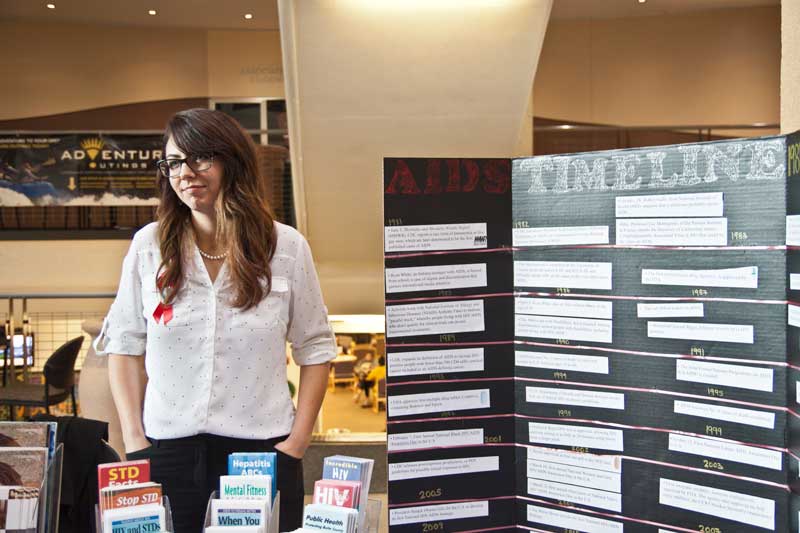[metaslider id=39042]
Photographs by Ernesto Rivera
Most people celebrate their 30th birthdays by trying something they’ve never done before. Zipping through the clouds strapped to a nylon parachute or trekking across the county with their closest friends. Former Chico Mayor Scott Gruendl spent his doing something he’d never done before, too. He spent his birthday in a lab facility being told by a group of physicians that he was HIV-positive.
He was staring into the dark abyss of a quick and likely painful death.
Or so he thought.
Now 20 years later, healthy as he’s ever been, he spent the last day of his second term as mayor reflecting on his life experiences and how he’s fortunate have come this far. Gruendl: 1 HIV: 0.
“I wasn’t supposed to live this long,” he said, emotionally shaken. “I never thought I’d to make it to 50. That was a goal for me. I said ‘I’ll never live to 50, if I live to age 50 that would be miraculous.’ So I can’t even tell you how important it is to be here tonight.”
Chico State and the City of Chico celebrated World AIDS day with an informational fair in the Bell Memorial Union Monday afternoon and celebration of those lost to the disease at Trinity United Methodist Monday evening.
Organizations such as the Butte County Health Department, Chico State’s Gender Sexuality and Equity Center and the Office of Diversity and Inclusion set up booths in the BMU and spent the afternoon informing students, faculty and staff on the dangers of the continuing HIV and AIDS pandemic and what can be done to stop it.
Fabi Paniagua, intern with Chico State’s Office of Diversity and Inclusion, said that the campus is working with a number of organizations on World AIDS Day to inform students about the dangers of HIV and AIDS and how they can help to combat the disease.
“We’re definitely advocating to go get tested,” she said. “You don’t really know the signs until you go get tested. This is a disease that can live dormant inside of you. There’s still a lot of stigma to it so most don’t know that people can live successful lives.”
The HIV and AIDS viruses are most commonly passed by unprotected sex with an infected partner and the sharing of drug-injecting equipment, according to the Centers for Disease Control and Prevention. While there is no known cure for HIV and AIDS, newly-developed treatments have been developed to curb the spread of HIV and AIDS.
Eliza Dyer, LGBTQ+ program coordinator of the Gender and Sexuality Equity Center, said its most important that students keep aware of their bodies and minds.
“I think students need to take their sexual health into their own hands,” Dyer said. “There is a lot de-stigmatizing that needs to go on so educating yourself about how (contracting HIV and AIDS) works, why it happens, reason why the disease is spreading, what is and isn’t being enough done about it and what the barriers are to those trying to access healthcare and being a good resource for anyone that you know.”
At the evening celebration, some of the local panels of the AIDS quilt, 3-by-6-foot cloth panels — most commemorating the lives of those who have died of AIDS — stitched together by significant others, friends and family members, blanketed the walls and draped behind the stage signifying lives lost to the deadly disease.
Those affected were young and old. They represent different religions and ethnicities All interconnected, all succumbing to the same disease and showing everyone that HIV and AIDS does not discriminate.
Masters of Ceremony and health officials Jim Gamez and Laurie Gardner stressed the importance of open lines of communications with sexual partners, knowing one’s health status and getting tested for HIV and AIDS. Those who are particularly at-risk for contracting the virus should get tested regularly.
“Desperate measures call for desperate action,” Gamez said.
In his last official act as mayor, Gruendl proclaimed Dec. 1 to be AIDS Day in Chico.
“It is one of those life changing events,” he said. “The things that we dread the most, that when they actually happen it is really amazing. This isn’t about glamorizing living with HIV or AIDS, it’s really about showing the resiliency of the human character.”
[box]
HIV/AIDS stats and facts
• Number of infected in California: 122,382
• Number of infected in United States: Approx. 1.2 million
• Number of infected in the world: More than 35 million
• An estimated 50,000 new HIV infections occur in the U.S. each year.
• It is estimated that almost one-fifth of those people don’t know they are infected.
• In 2011, more than 20 percent of people diagnosed with HIV in the U.S. were women.
• The vast majority of newly diagnosed HIV-positive women contracted the virus through heterosexual sex.
• In 2010, 31 percent of all new infections occurred among people aged 25 to 34, followed by individuals aged 13 to 24 at 26 percent.
Source: amfAR.org, the foundation for AIDS research
[/box]
David McVicker can be reached at newseditor@theorion.com or @DavidPMcVicker on Twitter.





